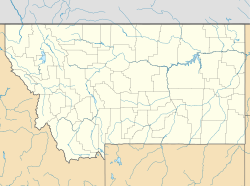Deer Lodge American Women's League Chapter House | |
 | |
| Location | 802 Missouri Ave., Deer Lodge, Montana |
|---|---|
| Coordinates | 46°23′54″N112°43′37″W / 46.39836°N 112.72685°W |
| Area | less than one acre |
| Built | 1910 |
| Built by | O'Neil & Bock |
| Architect | Helfensteller, Hirsch & Watson |
| Architectural style | Prairie School, Bungalow/Craftsman |
| NRHP reference No. | 82003177 [1] |
| Added to NRHP | June 14, 1982 |
The American Women's League Chapter House was built in 1910 by a local contractor, from plans with Prairie School and Bungalow/Craftsman influences designed by St. Louis architects Helfensteller, Hirsch & Watson. [2] It was listed on the National Register of Historic Places in 1986. [1]
It was deemed significant for its association with the American Women's League and for serving "for over 70 years as a center for women's civic and cultural activities within the community." [2]

